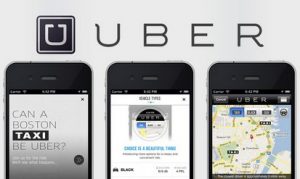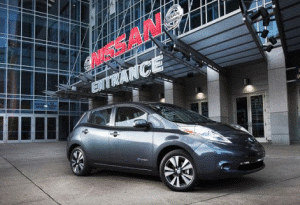 Automakers may follow Daimler’s lead in carsharing and ridesharing services. Daimler’s Car2Go carsharing service has been opening new locations in North America and Europe this year – and now Toyota and Ford are investing more in these alternative transportation services.
Automakers may follow Daimler’s lead in carsharing and ridesharing services. Daimler’s Car2Go carsharing service has been opening new locations in North America and Europe this year – and now Toyota and Ford are investing more in these alternative transportation services.
Toyota’s i-Road is a small three-wheel car that’s being tested out in a carsharing program in Tokyo designed to support public transport. It’s also being used as part of a carsharing program in the French city of Grenoble. Toyota’s concept is tied into commuting workers in cities who may choose to switch from their car to trains while going to and from work.
The Toyota i-Road is small enough to cut through traffic and may help alleviate congestion in cities. It’s being tested out for now with carsharing service Park2 and is being marketed to corporate clients and individual members.
Ford is also funding a test project that could bring a ridesharing service to the market that would compete with Uber. Ford is working on its own ridesharing mobile device application and a vehicle that would provide the transportation. Ford’s ridesharing shuttle may be tested out on the streets of London staring later this year.
There are no details on the vehicle yet, but it will be a “dynamic social shuttle,” that’s part of about 25 experiments Ford has taken on. It’s part of Ford’s game plan to focus less on vehicle manufacturing and more on mobility.
Automakers are closely following the growing interest in ridesharing services like Uber and carsharing services such as Car2Go and Zipcar. They’re following the demographic trends of more people moving into major urban environments, and younger potential customers putting off getting their drivers licenses and vehicles. Vehicle sharing could also help alleviate traffic congestion and air pollution in densely populated cities.
BMW also sees it as a way to get consumers more excited about owning one of their products. Richard Steinberg, who used to head up BMW and Mini’s electric car sales in North America, now serves as CEO of DriveNow USA, a BMW-owned carsharing program. “We definitely get lots of people excited about being behind the wheel of a premium product,” Steinberg said.
BMW appears to agree with Ford on the changing role of automakers. BMW has added that it not only leads the way on premium products but it now includes the phrase “and premium services for individual mobility” in its mission statement, according to Steinberg.
Major auto insurance provider USAA is taking ridesharing very seriously. USAA is working with state insurance departments in Colorado and Texas to offer coverage for drivers in Uber and other ridesharing services. “Ridesharing is a growing industry, and it’s important that our members have the right insurance coverage,” said Alan Krapf, president, USAA Property and Casualty Insurance Group. State Farm and Allstate are also looking into different insurance coverage options for drivers who work for ridesharing companies.

